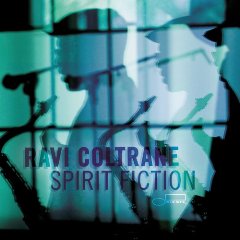Ravi Coltrane - Spirit Fiction (2012)
Ravi Coltrane - Spirit Fiction (2012)

1. Roads Cross (5:04) 2. Klepto (7:30) 3. Spirit Fiction (2:28) 4. The Change, My Girl (6:47) 5. Who Wants Ice Cream (6:32) 6. Spring & Hudson (2:21) 7. Cross Roads (4:03) 8. Yellow Cat (6:50) 9. Check Out Time (7:26) 10. Fantasm (4:08) 11. Marilyn & Tammy (5:42) Personnel: Ravi Coltrane - tenor & soprano saxophones; Joe Lovano - tenor saxophone (9, 10); Louis Perdomo - piano (1, 3, 4, 7, 11); Drew Gress -bass (1, 3, 4, 7, 11); EJ Strickland - drums (1, 3, 4, 7, 11); Ralph Alessi -trumpet (2, 5, 8, 9); Geri Allen - piano (2, 5, 8-10); James Genus - bass (2, 5, 8, 9); Eric Harland - drums (2, 5, 8, 9).
It's easy to imagine the double-takes that must have occurred when introductions were being made around New York in the early 1990s. "What'd you say your last name is, son?" Let's face it, if you're walking around with the name of a God, your last name is Coltrane and your first name is not John, and you're going to play the tenor saxophone, same as your old man, people are going to want to know what that's all about.
Ravi Coltrane is not and has never been a pretender trading on his family legacy. He paid his dues as a sideman, and his dates as a leader have shown a steady march forward in his personal playing style and as a composer. He doesn't sound like his father, and if his last name was Smith he'd still one damned good musician. Nevertheless, there was some palpable excitement when—it seems like ages ago, in 2010—it was announced that the younger Coltrane had signed with the storied Blue Note Label. Even the New York Times ran an article—not about music, but about music that had yet to be made. Coltrane at Blue Note made for a rarity in jazz these days: buzz in the wider world.
Well, almost three years Later, we finally have the record, Spirit Fiction, and it's safe to say that this artist/label collaboration is a spectacular success. Coltrane vaults himself to a new level of compositional and improvisational excellence with a record that's a complete, seamless musical statement. Despite using a blend of two separate bands, as well as a guest appearance by fellow tenorist Joe Lovano (who also co-produced the record), there is a textural unity to the music that just feels whole. But that wholeness doesn't come at the expense of creative freedom; quite the opposite, in fact. The record is dense with intertwining musical ideas that weave together into whole cloth. Between tracks, individual songs veer between borderless improvisation and well-crafted melodies, but they all compliment each other, never sounding disconnected as the record proceeds. Swapping out musical ideas like that on a single date can sometimes leave a record feeling a little like a scholastic exercise: now here's our free piece; now here's our ballad. Not here. The consistency of Coltrane's horn—clean and firm—binds it all together into solid coherence. That's a good trick considering there are two separate bands in play here.
With Spirit Fiction, Coltrane has attained new level of personal musical accomplishment. This is a fully realized musical statement that stands solidly from beginning to end. It's a well-oiled performance from a cast that has obvious affinity for the leader and the chops to carry out his vision. The name Coltrane may evoke instant nostalgia for a legend, but today it also means something else. Coltrane: a great player, playing now, with a great band and a great record. Let's have some more of this, please. ---Gregg Simons, allaboutjazz.com








